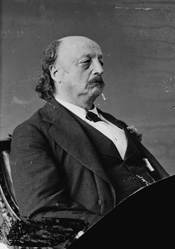Famous Americans
Famous American New Hampshirians

Benjamin F. Butler
1818-1893
Summary ... Video ... Color Page ... Pictures ... Netlinks ... Timeline ... Biography ... ProjectsBenjamin Butler was born in Deerfield, New Hampshire. He studied law in college and became a representative to the Massachusetts legislature.
Butler was a Brigidier General in the Massachusetts militia at the time of the attack on Fort Sumpter which began of the Civil War. He took his troops to protect Washington, DC, and won a decisive battle to keep Baltimore, Maryland from falling to the Confederate Troops.
General Butler was sent to capture New Orleans, Louisiana where he earned the nickname of "The Beast" for his harsh treatment of captured Confederate troops. He armed and organized African-Americans into Union units and provided for the former slaves to learn to read and write.
President Lincoln sent him to command Fortress Monroe in Virginia. As the commander, he made the decision not return slaves to their owners, but to call them "Contraband of War". This gave freedom to all slaves who escaped to the fort and asked for federal protection.
After the war, Benjamin Butler was elected to the US Congress. As an active member of Congress, he opposed the actions of President Andrew Johnson, believed that Andrew Johnson was involved in the assassination of President Lincoln, and worked to get Johnson impeached. Butler worked for Civil Rights legislation, and during the presidency of Ulysses S. Grant, supported legislation to curb the Ku Klux Klan.
After serving four terms in Congress, Benjamin Butler was elected Governor of Massachusetts. He ran for president on the ticket of the Green-back Labor Party and Anti-Monopoly Party.
Butler published his Memoirs in 1892 and died in Washington in 1893.
Netlinks for Benjamin F. Butler
Wikipedia: Benjamin Butler, Politician
Schoolnet: Biography of Benjamin Butler
Benjamin Butler: The Impeachment of Andrew Johnson
Answers: Biography of Benjamin Butler
New World Encyclopedia: Benjamin Butler
Congress Bioguide: Benjamin Butler